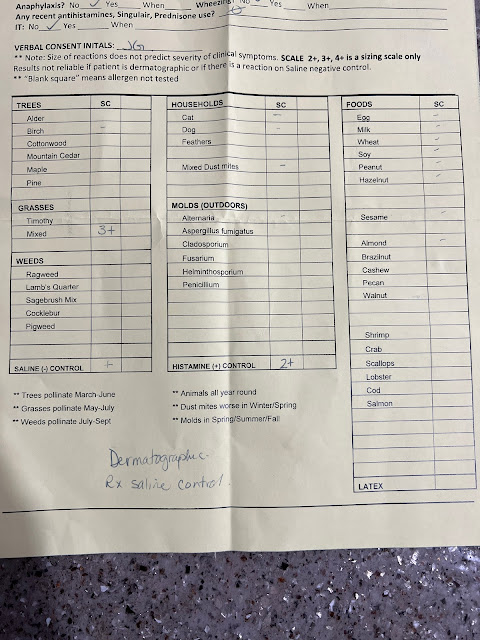Troy can be very sensitive and shy when it comes to people touching his body and a lot of it stems from his autism attributes. He was very well behaved during the whole process and the nurse asked him if he would like to be informed of each thing as she does it and he chose not to be told other than the fact that she was going to poke him in the arm with a little plastic toothpick type tool. He was ok with the process so we got started.
The nurse wrote 14 numbers on Troys arms and gave me a list of the oils that would be administered during testing. For $30 you get the basic and most common allergens tested but you can get a lot more done if you like. Troy was tested for birch tree, grass, cat, dog, dust, mold, egg, milk, wheat, soy, peanut, hazelnut, sesame, and almond.
The nurse then took tiny picks and poked the area next to the number with oil on it into Troys arm and gave it a small twist to pierce the skin. After this you are told not to scratch the spots as they are going to get itchy during reaction. We were able to rub around the area but not touch the oil or spots. You need to sit for 15 minutes and wait until hives begin to appear.
Irritation began to show up right away which is actually just a dermatographic reaction also known as sensitive skin. This gives the test a result that can be harder to read so they also advised and prescribed blood work. The one hive that did appear was from grass and it was a very big reaction. This can also be referred to as “Hay Fever” which is basically cold symptoms that are created by an allergic reaction rather than a virus.
Now we know why our son is having such issues in the spring and into summer. Grass pollinates during May - July around here and when that’s happening his allergy is the strongest. Now since we have tried other meds without them working they prescribed a saline spray that also has steroids in it to combat the symptoms, as well as a prescription strength allergy medication to take orally.
If you are unsure of what your child is allergic to it might be worth getting the test. Now we know when to expect symptoms and we can work on ways to avoid causing a reaction by taking preventative measures.
If your child is allergic to grass you can try these tricks to keep them comfortable:
- Take allergy meds during pollination periods
- Where protective clothing
- Limit the amount of time spent on the grass
- Use saline rinses during flare ups
- Shower after being outside
- Wear sunglasses to protect eyes from pollen
- Use an air purifier
- Avoid being outside when the lawn is being mown
Hopefully you can try to avoid symptoms that cause your child to be uncomfortable in the future with these great tips and tricks!





No comments:
Post a Comment